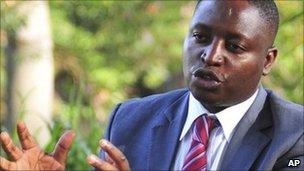Uganda anti-gay bill 'shelved by parliament'
- Published

MP David Bahati has said the death penalty clause is likely to be dropped
Uganda's parliament has adjourned without debating a controversial bill which includes the death penalty for some homosexual acts.
It had been reported that a vote could be held on Friday.
The Anti-Homosexuality Bill has been condemned by Western leaders and human rights groups, some of whom are celebrating victory.
The bill, first introduced in 2009, could still be brought up when the new parliament meets later this year.
Uganda is a largely conservative society and many people condemn homosexuality both as un-African and un-Christian.
But in recent years, some gay rights groups have been set up in the country.
Homosexual acts are already illegal in Uganda but the bill would increase the penalty for those convicted to life in prison.
Those found guilty of "aggravated homosexuality" - defined as when one of the participants is a minor, HIV-positive, disabled or a "serial offender" - would face the death penalty.
Anyone failing to report to the authorities a person they knew to be homosexual would also be liable to prosecution.
International pressure
Internet campaign group Avaaz said the bill's lack of progress was a "victory for all Ugandans and people across the world who value human rights".
"We must now ensure this heinous bill can never return to parliament again," said Avaaz campaign director Alice Jay.
Gay rights campaigner David Kato was killed in January
Maria Burnett, of Human Rights Watch, said it would still be a very long fight to stop the Ugandan legislation as "the issue has not gone away".
"The international pressure over the last year and a half has been very important to show that Uganda cannot act in isolation from the international community," she said.
US President Barack Obama has condemned the bill and donors have urged Uganda's government to ensure the measures never become law.
But David Bahati, the MP who introduced the private member's bill, said he would try to reintroduce it when the next parliament convened after February's elections, and said it had achieved his goal of sparking debate.
"We have made important steps in raising the issue and that will continue," he was quoted as saying by the AFP news agency.
In January, David Kato, a campaigner who led condemnation of the bill, was murdered not long after suing a paper that outed him as gay. Police denied the killing was because of his sexuality.
Three months before the murder, Uganda's Rolling Stone newspaper had published the photographs of several people it said were gay, with the headline "Hang them".
- Published4 May 2011
- Published27 January 2011
- Published29 January 2011